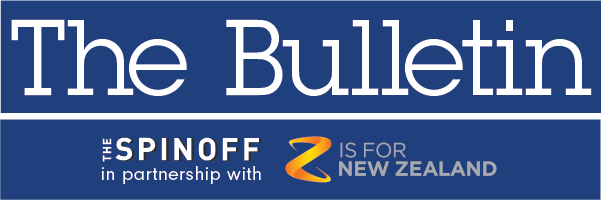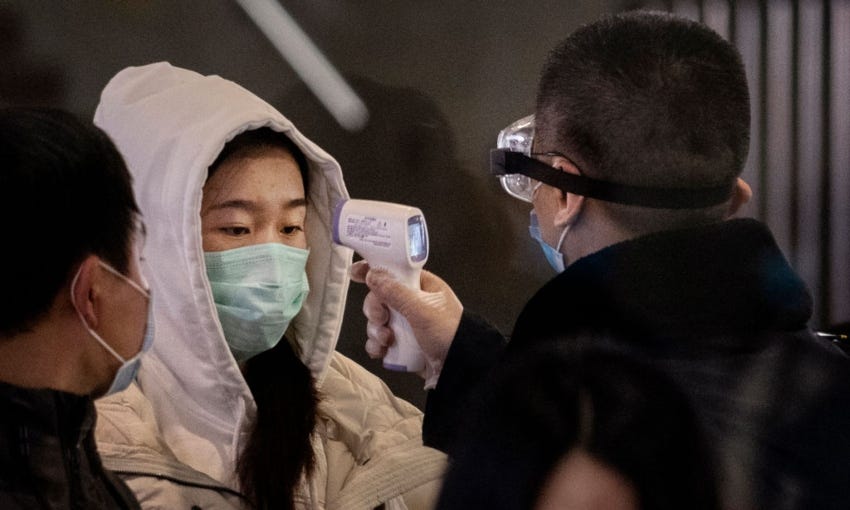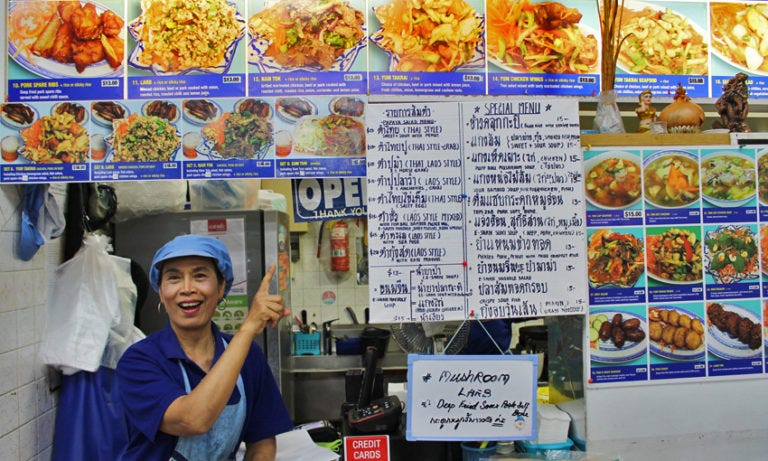Response to Wuhan coronavirus ramps up
"Alert but not alarmed" is the message from the Ministry of Health

Good morning and welcome to The Bulletin for Friday 24 January, by Alex Braae for The Spinoff. Presented in partnership with Z Energy.
In today’s edition: Response to coronavirus ramps up, PM and Māori leaders agree to meet, and Labour launches their political year at retreat.

Image: A train passenger from Wuhan being checked for fever after arriving in Beijing (Getty Images)
A pandemic response plan has been triggered by the government around the Wuhan coronavirus. The NZ Herald reports an incident management team has been established, and information is being given to travellers at the border. Health minister David Clark says the government is "alert but not alarmed" about the virus, and the ministry has an information page on their website which assesses the risk of an outbreak in New Zealand as low. So far no cases of the deadly virus have been seen in New Zealand, though it has spread from China to neighbouring countries, and a case has been seen as far away as the USA. It has certainly escalated in the space of just a week, with 17 people now believed to have died as a result of it.
It comes after accusations from the opposition that the response so far has been slow, and that it would not be prepared if the virus were to arrive in New Zealand. National's Michael Woodhouse says the virus should be reclassified as a notifiable disease – which would make it a requirement for health professionals to tell their local DHB's Medical Officer of Health about if they say a case. Woodhouse also wants to see increased surveillance at international airports, and more health questions asked of people arriving in the country.
The response in China has been much more intensive and far-reaching. This CNN story from overnight has details of the partial lockdown Wuhan City has been placed in – a significant undertaking and massive effort because Wuhan has a population of around 11 million people, and is a major transportation hub for China. The shadow of SARS hangs over it all – a 2002 virus outbreak that killed many more people after the response was botched. This piece from The Verge outlines how it shows the significant advances made by China in public health since then.
There are New Zealanders currently trapped in Wuhan, and this Radio NZ story included comments from several people who now have to wait it out. International students are also likely to be affected, and the NZ Herald confirmed at least one school is expecting a pair of students from Wuhan to start later in the term, and stay at home for a week after arriving in the country.
The PM and Māori leaders concerned about Whānau Ora funding have agreed to meet to discuss the issue, reports Radio NZ. The offer came from the PM, and is in stark contrast to the response given to said Māori leaders when they sent a letter outlining concerns last year, which never received a response. However, the context has now changed, both with a claim being filed with the Waitangi Tribunal, and with two particularly important political events for the Crown-Māori relationship coming up – Rātana this weekend, and Waitangi Day at the start of February.
Labour have launched their political year with a retreat in Martinborough. The Spinoff's Toby Manhire has analysed what the biggest items on the agenda are likely to have been, and what issues will be front and centre in election year.
One point out of it that has been reported is around transparency and honesty, with Jacinda Ardern essentially saying she wants a good clean fight. The party will join the Greens and ACT in signing up for a facebook ad transparency tool, reports Stuff's Henry Cooke. Several other parties, including National, have not. Having said that, signing up to the tool doesn't mean the ads have to be honest – that's in the eye of the beholder and Facebook has no wish to be the judge – rather it means that people will be able to see who ads are being targeted to, and how much is being spent.
There's a rather troubling set of messages in an exhibition hosted by the Chinese embassy at Te Papa. Interest's Jenée Tibshraeny went along to the exhibition, which described the 'great success' of government policy in de-radicalising the population of Xinjiang – other observers have described the policies being carried out as a form of cultural genocide. In a speech at the event, ambassador Wu Xi also poured cold water on the idea of Taiwanese independence, and asserted that the 'one country, two systems' model has maintained stability in Hong Kong, which is certainly one perspective on the events of the past year there.
The country's newest mayors have now had enough time to get their feet under the desks, so how are they going? Radio NZ decided to ask five of them about the job so far. One interesting nugget out of it – new Tauranga mayor Tenby Powell suggested there had been something of a "reset" in relations between central government and the fast-growing city. Powell reckons the city's infrastructure is "about 15 years behind" where it needs to be, and it will be interesting to see how the government goes about helping them catch up.
Running a bricks and mortar business is hard enough, but it seems particularly challenging in the Auckland suburb of Newmarket right now. That comes out of this report from Newshub's Zac Fleming, who noted the many empty stores up and down Nuffield St. Those that remain say they're being squeezed by their landlord Westfield, who recently opened a brand new mall in the suburb. In turn, Westfield have defended themselves, saying they're supporting businesses on the street and will continue to do so.
Just briefly, a message from Leonie Hayden, Ātea editor at The Spinoff:
In my work for The Spinoff I routinely ask myself two questions: who does this give power to, and who does this take power from? I’m incredibly proud to work somewhere that asks those questions of itself as a matter of course, ensuring we’re not adding to the harm that negative stereotypes can cause to entire communities, and that we’re regularly giving a voice to powerful, smart, kickass people that have been denied a platform for ages. We don’t always get it right, but we are absolutely dedicated to trying to be the best Treaty partner we can be. If that’s important to you, please support our members fund so we can continue to uphold this kaupapa and the mana of people everywhere.
Got some feedback about The Bulletin, or anything in the news?
Drop us a line at thebulletin@thespinoff.co.nz

Right now on The Spinoff: Alice Neville meets the operators and punters at Food Alley, a beloved Auckland spot that will be closing down later this year. Madeleine Chapman writes about a warning on detox teas, a scammy product that has the wrong kind of explosive results. Renu Sikka writes about Makar Sankranti, an Indian festival of giving thanks. I speak to percussionist Myele Manzanza about RNZ Concert, and the difficulty of making a living as an experimental musician. And Tara Ward has an official ruling on a thorny social etiquette question – when is it too late to say Happy New Year to someone?
For a feature today, a continuation of the discussion around migration. This is a really insightful feature from The Correspondent, about the image that African would-be migrants have of Europe, and how that image is formed. It also delves into the propaganda being created by European government to try and dissuade them from travelling, and why it has next to no impact (apart from perhaps shoring up domestic xenophobia.) Here's an excerpt:
The Italian government put €1.5m into one 2016 project that shared videos of migrants’ testimonies – which were often horrifying – on social media.
The Australians are the leaders in aggressive anti-migration campaigns. In 2014, they launched the NO WAY campaign (tagline: “You will not make Australia home”). The video shows an angry-looking soldier in camouflage fatigues looking straight into the camera: “If you travel to Australia illegally by boat, there is no way you will ever make Australia home.”
However, no European country would be caught stating explicitly that they are running a campaign against migration. Europe’s goal is “safe and informed migration”. According to the EU, the information in the campaigns is “factual ” and the aim is “neither [to] deter migrants from setting out for Europe nor create pull factors for them to do so”. The idea is to provide “a realistic picture” that migrants can use to make choices.
Honestly, it's like 2018 never happened at all. The Silver Ferns are surging, with two wins from two at the Nations Cup, and a spot in the final secured. The NZ Herald's Liam Napier was there in Birmingham to see the latest result – a crushing win over Jamaica, who in recent years have had the measure of New Zealand. But even without their veteran core, this Silver Ferns team is playing exceptional netball, running up a whopping 71 points in the 26-point win.
And the White Ferns get a big series underway today, a five match series against South Africa. Today's game and another on Sunday will be at Eden Park, and I'm kicking myself for being out of town. Subsequent games will progressively move south down the country. The series matters a lot both as a warm-up for the World Cup in February, and an early test for Sophie Devine's newly inaugurated captaincy. Meanwhile, the venues for the 2021 ODI World Cup have been announced, with Hagley Park in Canterbury being awarded the grand final.
That's it for The Bulletin. If you want to support the work we do at The Spinoff, please check out our membership programme.




